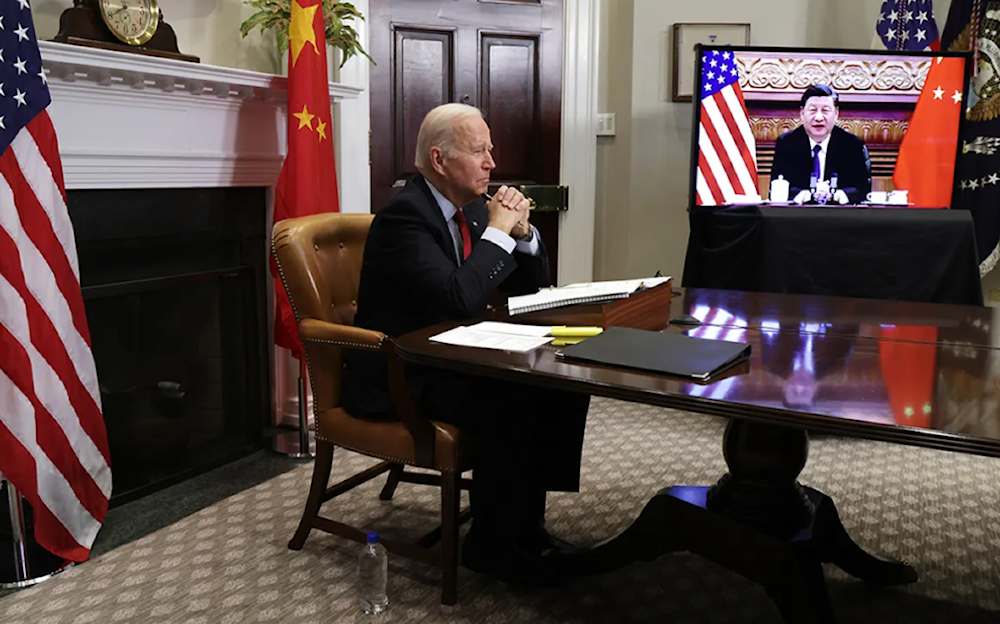US forced Dutch manufacturer to cancel chip shipments to China
A Bloomberg report reveals that ASML planned to transfer the last high-end deep ultraviolet lithography machines to its Chinese partners before new Dutch export limits take effect in January.
-

US President Joe Biden participates in a virtual meeting with Chinese President Xi Jinping at the Roosevelt Room of the White House on November 15, 2021. (AFP)
According to Bloomberg, the Biden administration urged ASML, the largest Dutch semiconductor producer, to prohibit shipments of sophisticated equipment to China in another attempt to prevent Beijing from gaining an advantage in the semiconductor race.
Advanced Semiconductor Materials Lithography or ASML is a Dutch company that specializes in producing not the semiconductors, but the Extreme Ultraviolet (EUV) lithography machines that manufacture the chips.
The article details that ASML planned to transfer the last high-end deep ultraviolet lithography machines to its Chinese partners before new Dutch export limits took effect in January, but US authorities interfered and persuaded the business to cancel them.
Furthermore, US National Security Advisor Jake Sullivan personally called the Dutch government late in 2023 to discuss supply deliveries to China, but Dutch officials asked him to speak directly with ASML about the deliveries of immersion deep ultraviolet lithography machines.
Subsequently, Sullivan's call resulted in the cancellation of a limited number of machine shipments, but the exact quantity is unknown.
The United States, the Netherlands, and Japan agreed to strengthen export controls from the start of 2023 to block the sale of high-end chips to China and to deny Beijing access to high-end equipment.
In March of 2023, the Netherlands said it introduced new plans to restrict chipmaking technology imports to China, which will be added to existing anti-China provisions adopted earlier following pressure from Washington to limit Beijing's access to semiconductor manufacturing technology.
Amid the global struggle between powers, mainly China and the US, to gain tech superiority and establish world dominance in the industry, the European country has been the center of the US attention as it is home to one of the most advanced firms in the tech industry worldwide.
In October 2022, the US Department of Commerce introduced sanctions on China, putting hurdles in Beijing's way to buy or develop advanced semiconductors.
China has filed a case with the World Trade Organization (WTO), hitting back at US export sanctions on microchips, further fueling the tech war between the two countries.
China plans to build AI chips production site to counter US sanctions
According to a September report by the South China Morning Post (SCMP), China is reportedly preparing to construct artificial intelligence (AI) chip factories equipped with particle accelerators.
The main goal that China seeks to achieve is to produce its own particle accelerators to facilitate the creation of a cutting-edge laser source. According to SCMP, the accelerator's electron beam will undergo a transformation into a "high-quality" light source, essential for the on-site production of AI semiconductor chips.
The initiative has reportedly brought together a team of scientists from Tsinghua University, who are in active discussions with authorities in the Xiongan New Area to identify the most suitable location for the construction of these advanced chip factories.
By harnessing particle accelerators in the semiconductor manufacturing process, China seeks to reduce its reliance on foreign technologies, a move deemed critical for its economic autonomy, especially amid Western attempts to limit China's technological advance.

 3 Min Read
3 Min Read








